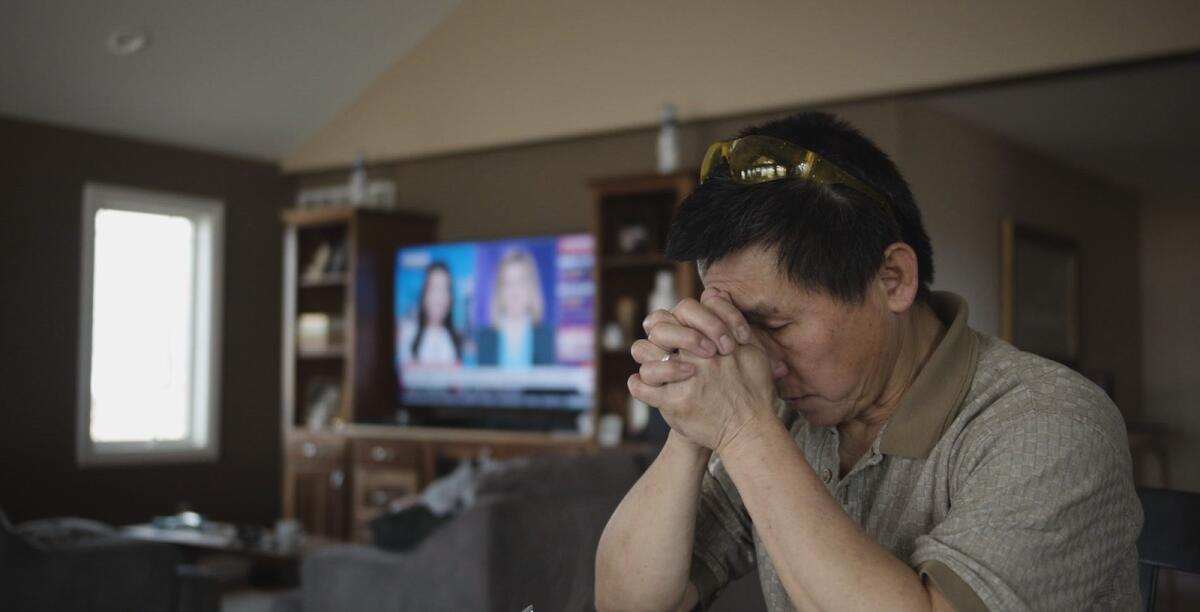Welcome to ‘Bad Axe,’ where a multicultural American family braves the pandemic

- Share via
When filmmaker David Siev first picked up a camera in March 2020 to capture his parents and siblings reuniting under the same roof at the outset of the COVID-19 lockdown, he never could have anticipated that the intended family keepsake would evolve into such a penetrating assessment of American society at the time of the pandemic.
But the intimate and remarkably relatable documentary that is “Bad Axe” takes its name from the rural Michigan town where Siev’s Cambodian refugee father and Mexican American mother raised a family and ran a restaurant; Bad Axe turned out to provide a tellingly relevant backdrop for the film that went on to win the Audience Award at the South by Southwest Film Festival in Austin, Texas, this year.
For your safety
The Times is committed to reviewing theatrical film releases during the COVID-19 pandemic. Because moviegoing carries risks during this time, we remind readers to follow health and safety guidelines as outlined by the CDC and local health officials.
Boasting a Walmart, two main traffic lights and many MAGA caps, Siev’s hometown may lack diversity but it holds the promise of the American Dream in the form of Rachel’s, the family-owned restaurant where he and his sisters, Jaclyn and Raquel, have worked from a young age.
A tricky financial proposition at the best of times, Rachel’s feels the pinch of uncertainty shared by so many businesses during the extended closures as it tries to adapt to the new normal with innovations such as take-out sushi nights and delivery service.
Meanwhile, all that family togetherness also begins to show its cracks, especially for patriarch Chun, who survived genocide in Cambodia, only for his PTSD to resurface four decades later.
“I was never as scared about the Cambodian Killing Fields as I am with the pandemic,” he confides to his son’s omnipresent camera.
Tensions are further heightened when his children and their partners opt to attend at Black Lives Matter protest despite their parents’ concerns that their visible involvement could hurt business, leading to a chilling confrontation with hate-spewing, gun-toting white supremacists.
“My parents are good at biting their tongue,” Jaclyn says of their lifelong work ethic/survival instinct.
As the pandemic drags on, Siev family members find themselves on the receiving end of increasingly anti-Asian sentiments, whether dealing with virulent antimaskers entering their establishment or fielding threatening calls and social media attacks after a promotional trailer for the documentary is posted online for a crowdfunding campaign.
Through it all, Siev kept his camera trained studiously on his close-knit family, with an approach informed by the cinema vérité work of Frederick Wiseman or Barbara Kopple. In the editing process, this assumed the poignant narrative structure of recent multigenerational assimilation-themed films such as “Minari” or “Tigertail.”
Despite covering so much sociological ground, the New York-based Siev insists that his film ultimately remains a heartfelt love letter to the town where, for better or worse, his family put down its roots and to which his sisters and their spouses have returned to raise their own nascent families and help run the family business.
Inevitably, in the process of placing Bad Axe under the microscope, Siev also succeeded in putting it on the map, with Rachel’s, the eatery named after his compassionate, committed mother, serving as its soulful, sustaining epicenter.
‘Bad Axe’
Not rated
Running Time: 1 hour, 40 minutes
Playing: Starts Nov. 18; Laemmle Glendale; also available on VOD
More to Read
Only good movies
Get the Indie Focus newsletter, Mark Olsen's weekly guide to the world of cinema.
You may occasionally receive promotional content from the Los Angeles Times.








